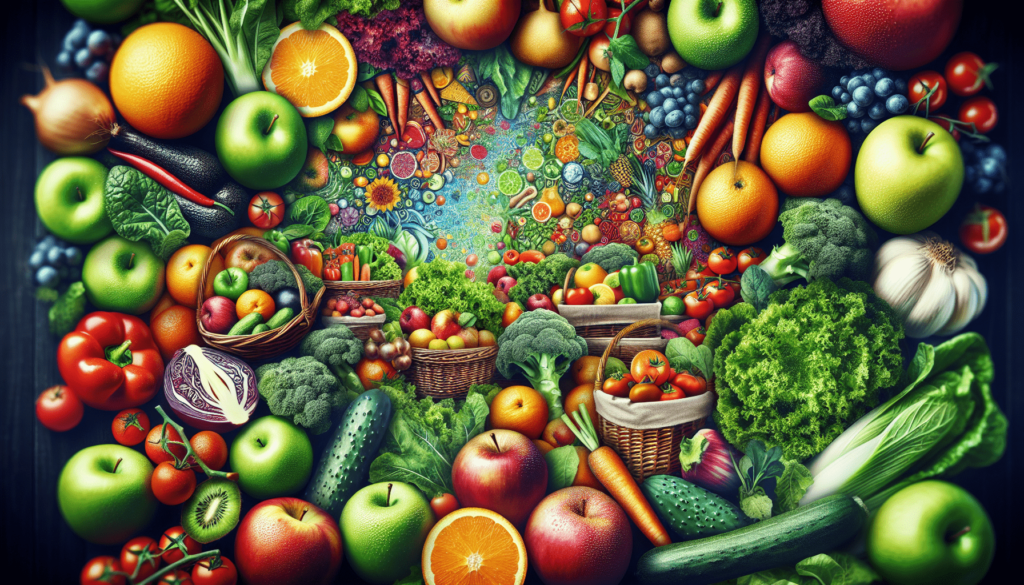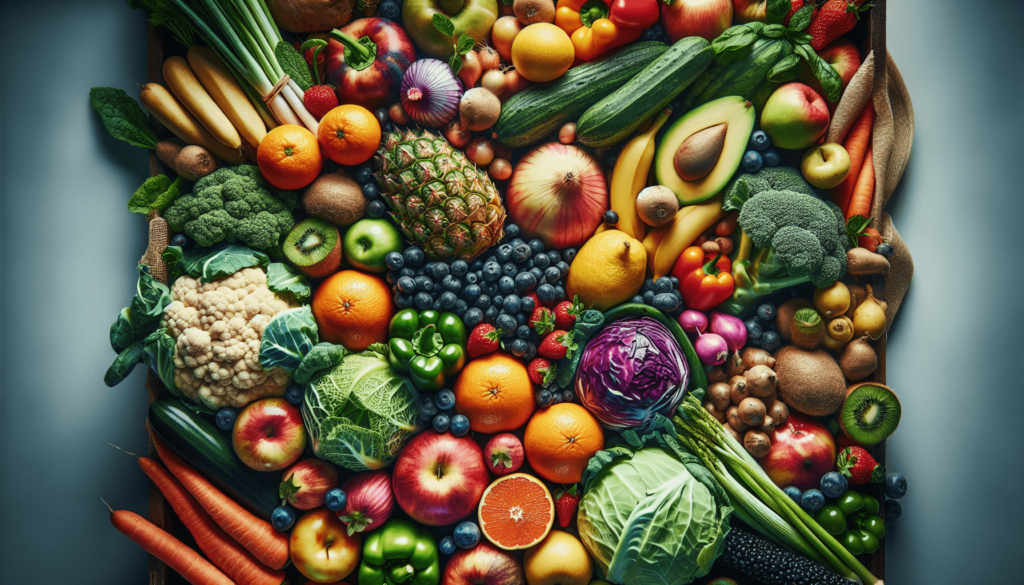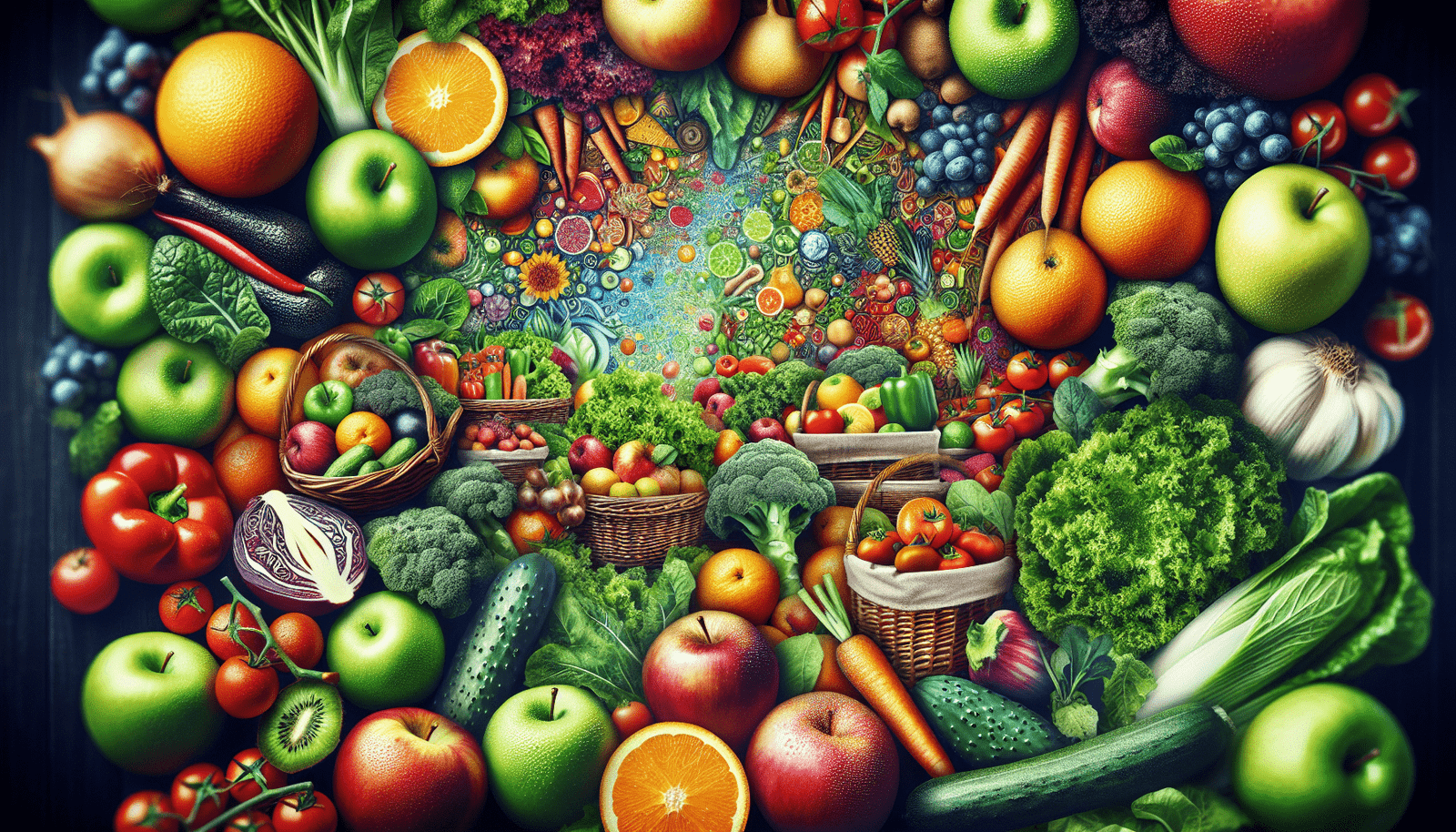In this article, you will discover whether organic foods are truly worth the cost. From exploring the benefits of organic farming to understanding the potential drawbacks, you will gain insight into the world of organic produce, meat, and dairy. Whether you are a health-conscious individual or simply curious about the organic food movement, this article will equip you with the knowledge to make informed choices about your dietary preferences. So, let’s embark on a journey to unravel the mysteries of organic foods and determine if they deserve a place on your grocery list.

Understanding Organic Foods
What Are Organic Foods?
Organic foods are agricultural products that are grown and processed following specific guidelines set by organic farming practices. These guidelines emphasize the use of natural and sustainable methods, avoiding the use of synthetic chemicals, pesticides, and genetically modified organisms (GMOs). Organic farming also promotes the responsible management of soil, water, and ecosystems, prioritizing biodiversity and animal welfare.
How Are Organic Foods Different from Conventional Foods?
The main difference between organic and conventional foods lies in the farming practices employed. While conventional farming relies heavily on synthetic pesticides, chemical fertilizers, and GMOs, organic farming takes a more holistic and nature-friendly approach. Organic farmers employ methods such as crop rotation, composting, and the use of natural pest control measures, ensuring the production of food that is free from synthetic additives and harmful chemicals.
The Benefits of Organic Foods
Organic foods offer numerous benefits, both for individuals and the environment. Firstly, they are free from synthetic pesticides, herbicides, and fertilizers, reducing the potential health risks associated with consuming these chemicals. Organic farming practices also prioritize soil health, leading to better soil fertility, nutrient content, and water retention. Moreover, organic foods often have higher levels of certain nutrients and antioxidants, as well as improved taste, due to the natural cultivation methods used. Additionally, supporting organic farming contributes to the conservation of biodiversity, reduction of pollution, and sustainable use of natural resources.
Organic vs. Conventional: Cost Comparison
The Higher Price Tag of Organic Foods
It’s no secret that organic foods tend to have a higher price tag compared to conventional foods. This is primarily due to the increased labor and production costs associated with organic farming methods. Organic farming often requires more manual labor, as well as the use of specific natural pest control measures. Furthermore, certified organic farmers also incur additional costs for inspections, certifications, and compliance with strict regulations. Consequently, these added expenses are reflected in the final price of organic foods.
Factors Affecting the Cost of Organic Foods
Several factors contribute to the higher cost of organic foods. One important factor is economies of scale – organic farms are typically smaller than conventional farms, resulting in less efficient and more costly production processes. Additionally, the limited availability of organic inputs and the higher prices of organic seeds and livestock can also drive up costs. Moreover, organic farming practices often require longer crop rotation cycles, which can decrease overall yield and further impact costs.
Is the Cost Justified?
While the cost of organic foods may seem prohibitive to some, it is essential to consider the value that organic production brings. Choosing organic foods helps support sustainable farming practices, protects the environment, and promotes better health outcomes. The potential long-term effects of pesticide exposure and the environmental damage caused by conventional farming practices make the higher cost of organic foods a worthwhile investment in one’s well-being and the planet’s future.
Pesticides and Health Concerns
The Use of Pesticides in Conventional Farming
Conventional farming relies heavily on the use of synthetic pesticides to control pests, diseases, and weeds. These pesticides are designed to kill or inhibit the growth of specific organisms, but their use can also have unintended consequences. The widespread application of synthetic pesticides can lead to environmental contamination, affecting soil, water, and air quality. Furthermore, repeated exposure to pesticide residues in food may pose health risks, ranging from acute poisoning to chronic diseases, including cancer and neurodevelopmental disorders.
Potential Health Risks of Pesticide Residues
Consuming foods that contain pesticide residues has raised concerns among health professionals and consumers alike. Certain synthetic pesticides have been linked to adverse health effects, particularly when exposure is prolonged or at higher levels. Children, pregnant women, and individuals with compromised immune systems are particularly vulnerable. While regulatory agencies set maximum residue limits for pesticides, some argue that long-term exposure to even trace amounts of residues may have cumulative effects on health.
Organic Foods and Pesticide-Free Production
One of the most significant advantages of organic foods is the avoidance of synthetic pesticide use. Instead, organic farmers rely on natural methods, such as integrated pest management (IPM), crop rotation, and the use of beneficial insects, to control pests. This reduces the risk of pesticide residues in organic produce and helps protect both human health and the environment. However, it’s important to note that organic does not necessarily mean completely pesticide-free, as some approved natural pesticides may still be used in organic farming.
Nutritional Differences
Do Organic Foods Have Higher Nutritional Value?
While organic foods are often touted as being more nutritious, scientific studies have provided mixed results when comparing the nutritional value of organic and conventional produce. Some studies suggest that organic foods may contain higher levels of certain nutrients, antioxidants, and beneficial compounds, possibly due to the healthier soil conditions in organic farming. However, other research indicates that any nutritional differences between organic and conventional foods are minimal and may not have a significant impact on human health.
Comparing Nutrient Content of Organic and Conventional Foods
The nutrient content of foods can vary depending on various factors such as soil quality, crop variety, and growing conditions. While organic foods may have slightly higher levels of certain nutrients, the differences can be small and subject to natural variability. Additionally, the impact of these nutrient differences on overall human health is still not fully understood. Therefore, choosing organic solely for nutritional reasons may not be necessary, but it can be a part of an overall healthy and balanced diet.

Environmental Impacts
Organic Farming Practices and Sustainability
Organic farming practices prioritize sustainability and environmental stewardship. These practices include the use of organic fertilizers, crop rotation, water conservation, and the protection of natural habitats. By avoiding synthetic chemicals and genetically modified crops, organic farming reduces the pollution of soil, water, and air, and promotes a more sustainable and regenerative approach to agriculture.
Reduced Chemical Pollution and Soil Degradation
One significant environmental benefit of organic farming is the reduction of chemical pollution. Synthetic pesticides and fertilizers used in conventional agriculture can leach into water bodies, contaminating drinking water supplies and harming aquatic ecosystems. Organic farming helps minimize these risks by avoiding the use of synthetic chemicals and promoting responsible soil management practices that prevent erosion and maintain soil health.
Conservation of Biodiversity
Organic farming methods play a crucial role in preserving biodiversity. By avoiding the use of genetically modified organisms and protecting natural habitats, organic farmers create a conducive environment for various plant and animal species. Organic farms often support pollinators, beneficial insects, and other wildlife, contributing to the maintenance of healthy ecosystems. Preserving biodiversity is vital for ecosystem resilience, food security, and the overall health of the planet.
Government Regulations and Certification
Certification Standards for Organic Foods
To ensure the integrity and authenticity of organic foods, various certification standards are in place. These standards are established by government agencies or independent organizations and outline the specific requirements that organic producers must meet. Examples of such standards include the USDA Organic certification in the United States and the EU Organic farming standards in Europe. These certifications cover aspects such as farm management practices, the use of inputs, labeling requirements, and the avoidance of synthetic chemicals.
The Role of Government Regulations
Government regulations play a crucial role in setting the standards and guidelines for organic farming practices. These regulations provide a framework for organic certification, define the use of specific terms, and aim to protect consumers from false or misleading labeling claims. Regulators often conduct inspections, validate organic claims, and enforce penalties for non-compliance. The regulatory oversight ensures that organic foods meet specific criteria and maintain the trust of consumers.
Ensuring Organic Integrity
Certification programs and government regulations work together to ensure the integrity of organic foods. Through the certification process, organic producers undergo inspections, record-keeping, and regular audits to verify compliance with organic standards. Moreover, consumer complaints or cases of non-compliance can trigger investigations and enforcement actions. This comprehensive approach helps maintain the authenticity of organic foods and instill confidence in consumers.
Consumer Perception and Market Trends
Growing Consumer Demand for Organic Foods
Over the past decade, there has been a significant increase in consumer demand for organic foods. People are becoming more conscious of their food choices and are willing to pay a premium for foods considered healthier, more environmentally responsible, and ethically produced. This growing demand has prompted greater availability of organic products in supermarkets, specialty stores, and farmers’ markets, making organic foods accessible to a wider range of consumers.
Factors Influencing Consumer Choices
Several factors influence consumers’ decision to choose organic foods. Concerns about health and food safety are often cited as primary factors, as people perceive organic foods as having fewer pesticide residues and potential health risks. Environmental awareness and the desire to support sustainable farming practices also drive consumer preference for organic foods. Additionally, personal values, dietary considerations, and ethical beliefs can shape consumer choices in favor of organic products.
Consumer Confidence in Organic Labeling
Maintaining consumer confidence in organic labeling is essential for the continued success of the organic food market. To address concerns about mislabeling or misleading claims, certification programs and government regulations ensure the accuracy and consistency of organic labeling. Consumer trust is further reinforced when independent third-party organizations certify organic products, providing transparency and accountability. High levels of consumer confidence in organic labeling contribute to the long-term viability and growth of the organic food industry.
Affordability and Accessibility
Challenges for Low-Income Consumers
One significant barrier to the widespread adoption of organic foods is their higher cost, which can make them less accessible to low-income consumers. Limited financial resources may force some individuals and families to prioritize cheaper conventional options over organic ones. This discrepancy in access to healthy and sustainable food can perpetuate health inequalities and limit the reach of organic agriculture to a broader population.
Steps to Increase Affordability and Accessibility
Efforts are being made to address the affordability and accessibility of organic foods. Some initiatives include providing subsidies and incentives for organic farmers, promoting urban gardening and community-supported agriculture (CSA) programs, and implementing nutrition assistance programs that prioritize organic options. These steps aim to make organic foods more affordable and widely available, ensuring that individuals of all income levels can make healthier, sustainable choices.
Alternative Options for Organic Food Purchase
For individuals facing financial constraints, there are alternative ways to access organic foods without significantly impacting the budget. Shopping at local farmers’ markets, where prices may be lower than at supermarkets, can provide access to affordable organic produce. Additionally, joining a community-supported agriculture (CSA) program or participating in bulk-buying cooperatives can help reduce costs. Finally, growing organic fruits and vegetables at home, even in small containers or window gardens, can offer a cost-effective way to enjoy organic produce.
Supporting Local and Sustainable Agriculture
The Importance of Supporting Local Farmers
Supporting local farmers is vital for fostering a sustainable food system and vibrant local economies. By purchasing organic foods from local farmers, consumers can contribute directly to the financial well-being of their communities. Moreover, buying locally reduces the need for long-distance transportation, cutting down on greenhouse gas emissions and supporting regional food security.
Building Sustainable Food Systems
Organic agriculture plays a crucial role in building sustainable food systems. By promoting regenerative practices, organic farming helps restore soil health, conserve water, and protect ecosystems. Furthermore, organic farming methods emphasize biodiversity and reduce dependence on non-renewable resources. These practices support the long-term sustainability of food production, ensuring the availability of nutritious and environmentally friendly foods for future generations.
Community Benefits of Organic Agriculture
Organic agriculture offers numerous community benefits beyond individual health and environmental sustainability. Organic farms often serve as educational resources, hosting workshops and farm visits to educate the public on organic practices and sustainable food production. Additionally, organic farming can contribute to the development of local food networks, fostering connections between farmers, consumers, and restaurants. These connections strengthen communities, promote food diversity, and provide economic opportunities.
Making Informed Choices
Understanding Labels and Certifications
To make informed choices when purchasing organic foods, it is important to understand the labels and certifications associated with organic products. Look for reputable certifications, such as the USDA Organic seal in the United States or the EU Organic logo in Europe. These certifications ensure that the product meets the required standards for organic production. Additionally, familiarize yourself with terms like “100% organic,” “organic,” and “made with organic ingredients,” as they indicate the level of organic content in the product.
Weighing the Costs and Benefits
When considering the purchase of organic foods, it is essential to weigh the costs and benefits based on personal priorities and budgets. Evaluate the potential health benefits, environmental advantages, and long-term sustainability when deciding if the higher price of organic foods is justifiable. Additionally, consider the availability of organic options, alternative sources for purchasing affordable organic products, and the values that organic farming represents.
Considering Personal Values and Priorities
Each individual’s dietary preferences, beliefs, and values will influence their choice to incorporate organic foods into their diet. Consider factors such as health goals, environmental impact, support for local farmers, and the overall sustainability of food choices. By aligning personal values and priorities with the benefits and costs of organic foods, individuals can make informed decisions about their purchasing habits and contribute to a more sustainable food system.

